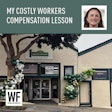If there's any silver lining to our dark economic cloud, it has to be the attractive leasing deals many business tenants are enjoying around the country. For the first time in many years tenants are in demand. No secret why: There's too much space around for the number of active businesses. No one likes to see a business shutter its doors, but the fact remains that for every business that closes, more space comes onto the market.
"Thanks to the current vacancy rates, tenants are seeing the biggest selection of space and the most accommodating landlords since the early 1990s," says Robert Bach, chief economist at Grubb & Ellis, a commercial real estate services and investment company based in Santa Ana, Calif. "Landlords are nervous, so tenants can get better deals."
For anyone grappling with a tough selling climate, all that empty space translates into a stronger negotiating position come lease-renewal time. "It is a tenant market right now," says Sharon Kahan, first vice president of CB Richard Ellis, a Chicago-based retail specialty brokerage. "If you are a tenant, then you are in a good position. There's quite a lot of space on the market and probably more still coming."
Negotiate Rates
So what steps can you take to capitalize on the favorable market? For starters, dust off your lease and take a fresh look at the numbers, even if the renewal date is still some time down the road.
"Business owners should be seeking relief right now from their landlords," says Andy Fried, director of the Small Business Development Center, Kennesaw State University, Kennesaw, Ga. "If the market is a whole lot lower than what's being paid on a given lease, negotiations should be initiated."
Maybe your first thought is a simple reduction in the monthly rental rate. And while that's not out of the question, another tactic is more likely to bear fruit with the same bottom line results: free rent for a determined number of months.
"Landlords don't like to reduce rent," explains Fried. "Many landlords buy real estate for investment purposes, so they want to keep what they call the 'capitalization rate' up. The higher the rent roll, the higher the value of the building." To maintain their investment, landlords will often opt to grant free rental months rather than cut the official rental rate.
Do Your Homework
The phrase "checking around the market" holds the key to your success in a lease renegotiation. "You have to do your research and line up your ammunition," Kahan says. You will want to answer two questions: What rents are others paying? And what space is available for you to move to?
With the answers to those questions in hand, you can approach your landlord with more power. And one more thing: Show your own numbers. Today more landlords are having to take into account what a tenant can afford to pay.
Win a Better Deal
As you pursue your own lease renegotiation, keep these tips in mind:
Favor shorter terms. Don't get roped in for a long lease term. Instead of a five-year lease, try to get a two-year lease with the option to renew for successive two-year terms.
Obtain the right of first refusal. Make sure your lease includes a "first right of refusal" clause, which gives you the right to decline a renewal before the landlord offers the space to someone else.
Consider a "blend and extend." If you have two years left of a five-year lease, try getting some immediate rent relief-in terms of free rent or a lower monthly rate-in exchange for signing a new five-year lease, provided you feel assured of your ability to fulfill a long-term contract.
Find an alternative location. Get a better seat at the negotiating table by having a fallback space if your landlord balks at a deal. You can say something like this: "Look, we have a brand new deal at a new location, where those guys will pay for us to be there. Or we can do a deal with you at this new number."
A struggling tenant who sincerely wants to pay can look attractive in this market. Landlords are falling on hard times, too. And no one wants to pursue a lawsuit against a vanished tenant: Landlords have very little to gain by going after a tenant who is unable to pay. Lawsuits are expensive, and collections after a favorable verdict are difficult.
So how urgent is the need to take advantage of the market? Seize the day but don't expect a quick sunset. "Given the expected slow pace of the economic turnaround, good deals are going to be with us for a while," says Bach. "They should be around through the first half of next year."

































